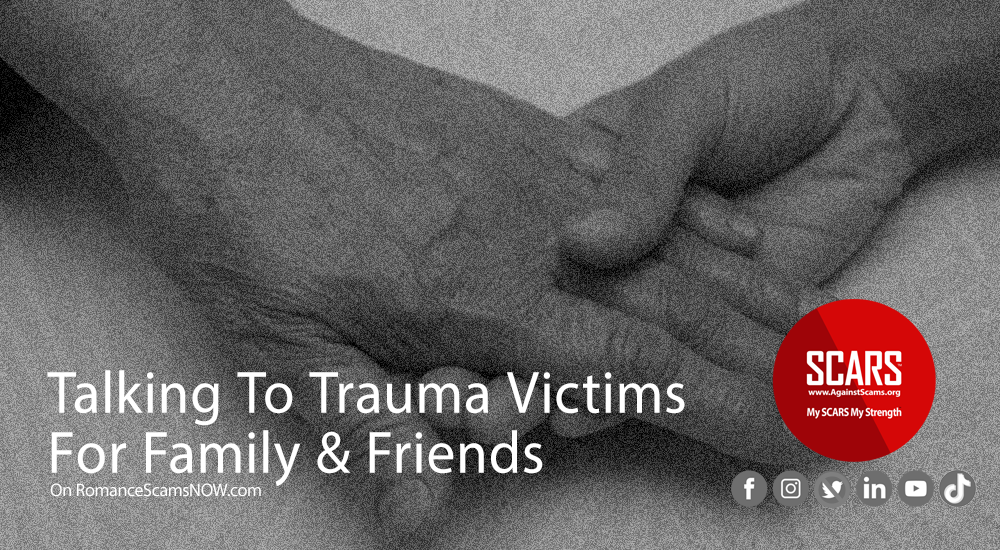How To Talk With Someone Suffering From Trauma
For Family & Friends
A SCARS Insight – Psychology of Scams
Trauma – Helping Family Or Friends Through It!
It can be difficult to know how to help someone you love and care for when they have gone through a distressing or frightening event.
It’s natural to want to make someone you love and care for feel better again, but it’s important to accept what has happened. There is nothing you can say or do to make the person’s pain disappear. That will happen with time, rest, and appropriate support. Explain to them that you are sorry about what they have had to experience and that you are there to help them in any way they need.
Offer Support After A Traumatic Or Distressing Event
It’s always good to ask the person who has experienced a traumatic or distressing event what you can do to support them. Suggestions for supporting a friend or family member include:
- Make time to be with the person and make it obvious that you are available. Sometimes, there can be a tendency to want to move someone on before they are ready because the traumatic experience makes us feel uncomfortable. Try to avoid doing this. People who have had a traumatic experience can feel very reassured by human contact.
- Don’t take their feelings to heart. They may be irritable, depressed, angry or frightened. Strong feelings and emotional outbursts are common – try not to take it personally. It is important to recognize that they have had a stressful experience and that their reactions are normal and will subside in time.
- You can help by reassuring the person that their reactions are normal.
- Offer practical support. You could do the housework or the grocery shopping for them, or pick up their children from school.
- Encourage the person to take good care of themselves, for example, by eating well, avoiding alcohol, drugs or stimulants, and by attempting to maintain regular sleeping habits.
- You may need to let the person have time by themselves.
- Let them know you are there for them without judging.
- Suggesting to a person that they maintain regular daily routines and habits can be helpful as well.
-
Talking about the trauma can be important
Suggestions include:
- Allow the person to talk about what happened, even if they become upset. Just be calm yourself and listen carefully – getting upset too doesn’t help.
- Don’t insist on talking if the person doesn’t want to. They may need time to be alone with their thoughts. Tell them you are there to listen whenever they feel ready.
- Reassure them you care and want to understand as much as possible about what happened to them. They may say you can’t possibly understand what they went through and shut you out. If they take this approach, they risk becoming isolated from their support networks. Be patient and see what else you can do to help.
- Try to make sure there is someone else they can talk to if they don’t want to talk to you about it.
- If there are some difficult decisions to be made, talk about the situation with the person and help them to identify the different options. However, don’t make the decision for them. Also, if it is only a short time after the traumatic event, suggest that it might be a good idea to wait a little longer before making a decision.
What Not To Do Or Say
Some ways in which it can be unhelpful to respond include:
- Don’t avoid talking about the event.
- Don’t think you know how the person should think, feel or behave. Everyone’s response is different.
- Don’t use general phrases such as ‘look on the bright side’ or ‘look for the silver lining’, but help them think about what they do have.
- Don’t judge their thoughts or feelings – being accepted helps put things in context.
- Don’t be impatient or expect them to ‘get over it’ in a certain time. It can take months or longer to recover from an event.
- Don’t insist they need professional help. Not everyone who experiences a distressing event needs treatment. It will be more effective if they get it when they want it, even if that is later than is ideal.
Help Them To Relax And Get Involved In Activities
Relaxation and fun are important recovery tools. Suggestions include:
- Try to involve the person in physical activity, such as walking or swimming. Exercise burns off stress chemicals, reduces muscle tension, and encourages better sleep.
- While the person needs to spend some time alone, help them to strike a balance. Socializing – even low-key events such as sitting around with friends – can help to reduce stress levels.
- Laughter is a wonderful antidote to stress. Find ways to help them to smile or laugh.
If at any time you are worried about your mental health or the mental health of a loved one, call Lifeline 13 11 14.
Where To Get Help
- Your doctor
- Your local community health center
- Counselor
- Psychologist
- Your local hospital
- Emergency services
- Local or National crisis hotline
Things to remember
- Find out as much as you can about distress, so you can understand something about what to expect.
- Allow the person to talk about what happened, even if they become upset.
- Don’t insist they need professional help – not everyone who experiences a traumatic event needs therapy.
Portions Courtesy of the Government of Victoria Australia




Leave A Comment